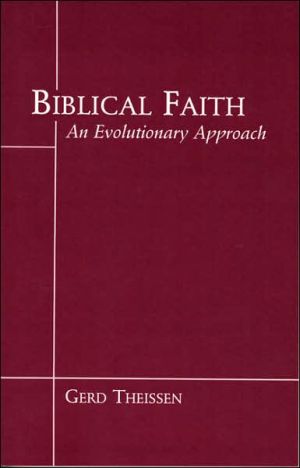

Most ebook files are in PDF format, so you can easily read them using various software such as Foxit Reader or directly on the Google Chrome browser.
Some ebook files are released by publishers in other formats such as .awz, .mobi, .epub, .fb2, etc. You may need to install specific software to read these formats on mobile/PC, such as Calibre.
Please read the tutorial at this link. https://ebooknice.com/page/post?id=faq
We offer FREE conversion to the popular formats you request; however, this may take some time. Therefore, right after payment, please email us, and we will try to provide the service as quickly as possible.
For some exceptional file formats or broken links (if any), please refrain from opening any disputes. Instead, email us first, and we will try to assist within a maximum of 6 hours.
EbookNice Team

Status:
Available5.0
36 reviews
ISBN 10: 0800618424
ISBN 13: 9780800618421
Author: Gerd Theissen
In the tradition of Karl Rahner and Teilhard de Chardin, this book from renowned New Testament scholar Gerd Theissen daringly probes the innermost sanctuaries of the biblical tradition through the lens of evolutionary theory. Without associating evolution with a nave optimism about progress, Theissen shows how a thorough examination of the "cultural evolution" of the Christian faith can yield glimmers of a possible goal of history: "complete adaptation to the reality of God."
Part One
Evolution and Faith: An Outline of the
Theory of Evolution
I The Problem: Three Contradictions between Scientific Thought and Faith
1. Hypothetical scientific thought versus apodeictic faith
2. Scientific thought is subject to falsification; faith goes against the facts
3. Scientific thought delights in dissension;
faith is based on a consensus
(a) Obligation to tradition versus obligation to innovation
(b) Obligation to concensus versus regulated dissent
(c) Dependence on authority versus 'discussion without domination'
II Biological and Cultural Evolution: Analogies and
Differences
1. The variability of forms of life
2. The selection of variants
3. The preservation of forms of life
III Knowledge and Faith as Complementary Expressions of Life: Relativizing the Contradictions
1. Science and faith as ways of coping with an unknown reality
(a) The intrinsic mystery of reality
(b) The possibility of 'experiences of resonance'
(c) The 'central' reality
2. Science and faith as ways of coping with the pressure of selection
3. Science and faith as openness to 'mutations'
(a) Dependence on tradition
(b) Dependence on social conformity
(c) Dependence on authority
Part Two
Faith in the One and Only God: Biblical Monotheism in an Evolutionary Perspective
I The Problem: Monotheism and the Transition from Biological to Cultural Evolution
II The Development of Biblical Monotheism:
A Historical Outline
1. The conflict over the exclusiveness of Yahweh
(a) The exclusive bond between Yahweh and Israel
(b) The exclusive bond between Israel and Yahweh
2. The conflict over the uniqueness of Yahweh
3. The conflict over the universality of Yahweh
(a) The response of moderate Hellenistic Judaism
(b) The response of radical Hellenistic Judaism
(c) The response of primitive Christianity
III Biblical Monotheism in an Evolutionary Perspective
1. Biblical monotheism as a spiritual 'mutation'
2. Biblical monotheism as a protest against the principle of selection
3. Biblical monotheism as a structure for adapting to the central reality
(a) The God without images
(b) The God without a family
Part Three
Faith in Jesus of Nazareth: New Testament Christology in an Evolutionary Perspective
I The Problem: Revelation and History
II The Proclamation and Ministry of Jesus of Nazareth:
A Historical Outline
1. Jesus as prophet
2. Jesus as wisdom teacher
3. Jesus as poet
4. Jesus as martyr
III Evolutionary Aspects of Faith in Jesus
1. Jesus of Nazareth as a 'mutation' of human life
(a) The problem of historical relativity
(b) The problem of historical conditioning
(c) The problem of historical immanence
2. Jesus of Nazareth as a protest against the principle of selection
(a) Jesus' proclamation of salvation: liberation from the pressure of selection
(b) The demands of Jesus: ethics directed against selection 1
principle of selection (c) The activity and fate of Jesus: overcoming the
3. Jesus of Nazareth central reality? a successful 'adaptation' to the
(a) God as coming king an illusionary expectation of an imminent end?
(b) God as heavenly father an illusionary regression to childhood?
Part Four
Faith in the Holy Spirit: The Experience of the Spirit in an Evolutionary Perspective
I The Problem: Can the New Life be Realized?
II Experiences of the Holy Spirit in Primitive Christianity:
A Historical Outline
1. The Spirit in conflict with 'sarkic' behaviour
2. The Spirit in conflict with social divisions and the primitive Christian social mysticism
3. The Spirit in conflict with the finitude of human awareness and human life
III The Experience of the Spirit in an Evolutionary Perspective
1. The Spirit as a mutation of humanity and the problem of Christian anthropology
(a) Renewal by the Spirit and human nature
(b) Renewal by the Spirit and human tradition
2. The Spirit as motivation against selection and the problem of ecclesiology
(a) The social ambivalence of biblical faith in Israel
(b) The social ambivalence of biblical faith in the church
3. The Spirit as adaptation to the ultimate reality and the problem of eschatology
(a) Hope in 'chance'
(b) Hope in 'necessity'
(c) Hope as justification
biblical faith: an evolutionary approach
biblical evidence against evolution
biblical evolution definition
biblical evolution
evolutionary approach religion
Tags: Gerd Theissen, Biblical Faith, An Evolutionary Approach